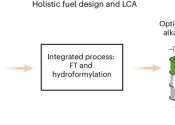Unveiling a new class of synthetic fuels
Researchers from RWTH, the Max Planck Institute for Chemical Energy Conversion, and ETH Zurich have made considerable advancements in synthetic fuels. Their study, which has the potential to revolutionize clean transportation, ...
17 hours ago
0
25









